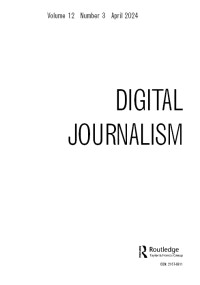Current issue
COMPARING DIGITAL JOURNALISMS ACROSS NATIONS AND CULTURES
Register now or learn more

Start a new submission or continue a submission in progress
Go to submission siteReady to submit? Start a new submission or continue a submission in progress
Go to submission site (link opens in a new window)Launched in 2013, Digital Journalism is the premier outlet for advancing international research into digital journalism studies (DJS). The journal aims to maintain its position as a leader of cutting-edge journalism research, providing a critical forum to advance scholarship that intersects with numerous disciplines. The Digital Journalism editorial team welcomes interdisciplinary research in the forms of original articles (7000-9,000 words), conceptual articles (4,000 words, exl. references), review articles (8-000-12,000 words), and advancing methods articles (4,000 words, exl. references). The Digital Journalism editorial team publishes novel research from all corners of the world and is committed to excellence, relevance, and diversity. We employ the Digital Journalism Studies Compass (Eldridge, Hess, Tandoc & Westlund, 2019) in navigating the scholarly terrain.
Digital Journalism pursues a significant and exciting editorial agenda including but not limited to:
All articles published in Digital Journalism have undergone rigorous peer review, based on initial screening by the Editor-in-Chief and members of the Digital Journalism editorial team, and anonymised refereeing by at least two anonymous and qualified reviewers. Additionally, special issue articles are systematically assessed by highly qualified guest editors. Instructions for authors can be found here.
Explore the most recently published articles
COMPARING DIGITAL JOURNALISMS ACROSS NATIONS AND CULTURES
INNOVATION and BUSINESS and PLATFORMS
Reach an engaged target audience and position your brand alongside authoritative peer-reviewed research by advertising in Digital Journalism.